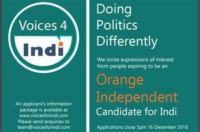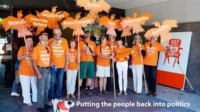
I rarely write about the same topic in two consecutive blog posts.
Normally, too, I just ask you to read what I write.
Today, I’m going against the flow. Not only am I going rehash what wrote about Australia reMADE and Voices for Indi, I’m also asking you do more than you normally do when you open a blog post.
Yes, I’m giving you some homework.
I Need Your Help
No, I’m not having some sort of sadistic flashback to my days in the college classroom.
Rather, I’ve decided to explore how we in the United States could adapt what my new friends in Australia have done as a way out of the social and political mess we find ourselves in.
And while I can’t require you to do I the way I could have if you were taking my senior seminar in political change, I would love it if you turned your assignment in by sending me an email with your reactions.
Since I’m assuming that my readers will have some cool ideas, I’ll work through them and find a time when all of us can get together and begin putting them into practice and breathe some activist life into the Connecting the Dots community.
So, just send me an email at chip@charleshauss.info with your reactions. Some vague instructions are at the end of the post.
Your reactions can take any form. Almost. Forty years ago, a student handed in an assignment typed on a roll of toilet paper. That probably won’t work on line (even if you have access to a typewriter), but feel free to be weird and creative.
And, if you know anyone else who might be interested, feel free to pass this post—and its assignment—along.
Imagine … Your Ordinary Paradise
I had seen the power of Australia reMADE’s video, Ordinary Paradise, when I showed it to kick off my session at the Alliance for Peacebuilding’s (AfP) PeaceCon last month. And I had been vaguely thinking about ways of using it more widely but hadn’t gotten very far until I was in the AfP office last week and met with Liz Hume. She had been out for a while so we were using the time to catch up. She mentioned that she is often gently criticized by colleagues to our left because she isn’t critical enough about the problems facing the US and the world.
One of the things I like the most about Liz is that she agrees that we should be focusing on constructive solutions—on what we are for. But she seemed pretty frustrated, so I moved the Australians to the top of my list of things to cover and pulled up their video on my iPad.
It clicked. Once Liz got over the strange Australian accent, she realized that the Australia reMADE folks were really on to something.
To see why, read the transcript.
Imagine waking up in the country of your dreams.
What’s it like? This place?
What does it look like?
Feel like?
Because we’ve been through an awful lot lately.
And we think it’s time to ask, “who are we now?”
What do we want for ourselves? Our future? Our families? Our whole country?
What do we want to see more of in the world?
What sort of legacy do we want to leave?
There is a power in ideas. We get to ask. To challenge. To renegotiate.
Dreaming itself propels us forward.
We get to focus on what do we want.
Not just we don’t want.
When we do, we realize that deep down, we all basically want the same thing.
This country that we dream of, this ordinary paradise.
It’s entirely possible. Common sense, even.
We start by naming it.
In order to remake it.
Dream big. Start here.
Their images and words together cast our minds back to John Lennon’s Imagine and then take us a lot farther because there are a lot more active verbs in their video. Dream. Name. Remake. Waking. Propel. Focus. Feel. Challenge. Renegotiate. Want. Start.
Like the Australians, we’ve been through a lot. We’ve learned a lot about what we are against. But now maybe it’s time to focus on what we a for—what we actually want. The Australia reMADE team went around their country and asked the kinds of questions that ended up in the video. They found the power of dreaming about a common future. And they went farther than Liz or I have by naming the common vision of an ordinary paradise and reached the conclusion that if we want to remake the present, we have to name the future we are aiming at.
This may be familiar to readers who have worked with the Omidyar Group, Appreciative Inquiry, and others who use systems-based approaches and terms like having a North Star.
But my new friends go farther. They have done some research. That allowed them to give that future a name. It is not some far off Garden of Eden. It is an ordinary paradise.
Don’t Mourn, Organize
If it were just that video or even the network of progressive groups that came together to form Australia reMADE, neither Liz nor I might not have been that impressed.

However, Lily Spencer of Australia reMADE had organized a meeting for Gretchen and me with Denis Ginnivan, one of the founders of Voices for Indi and, now, the broader Voices movement. To briefly summarize what I wrote last time, in the runup to the 2013 parliamentary election, a group of disgruntled voters in Indi—a rural district halfway between Sydney and Melbourne—decided to talk to their friends and neighbors to see what they wanted from a member of parliament. A few common themes came out, including support for climate change, the environment in general, honesty, and accountability. They didn’t see any of that that coming from their incumbent member and they were not inclined to vote for the opposition Labour party candidate who had next to no chance of winning anyway. So, they ran their own candidate. To their surprise, Cathy McGowan won and was reelected three years later. She then retired and her successor, Helen Haines, won the next two elections.
Since then, the Voices for movement has spread to about a third of the country’s 151 districts. Not all have run candidates, and no one wants the Voices movement to become a political party. Still, eight of the ten independent MPs elected in 2022 were supported by a Voices group.
 Having just read their book, The Indi Way, I know that we can’t simply replicated what they did. Australia is very different. They use a version of ranked choice voting. Voting is mandatory. Their language and customs are different—for example, a yard sign is known as a a corflute.
Having just read their book, The Indi Way, I know that we can’t simply replicated what they did. Australia is very different. They use a version of ranked choice voting. Voting is mandatory. Their language and customs are different—for example, a yard sign is known as a a corflute.
But, what if we started organizing something along these lines someplace? And then helped it spread? What if we had a viable alternative political organization that supported an American version of effective climate change policy and political honesty? Or our version of an ordinary paradise?
Or in the words (allegedly) uttered by the early twentieth century union organizer Joe Hill on the eve of his execution, “don’t mourn, organize.”
The Homework Assignment
That gets to the homework.
It isn’t the same as the homework I used to give when I taught political science. Then, I usually knew the answers I was looking for.
That’s definitely not the case here.
I’m not checking so see if you have mastered enough of Joe Hill’s (or anyone else’s) legacy to pass the course.
Quite the opposite.
I’m looking for your help. And your creativity—hopefully in more useful ways than my student showed in handing in her paper on a roll of toilet paper (which, of course, must have been pretty cool because I remember it all those years later).
I’d love to take these ideas and see what the various networks I work with could do with them.
So, in whatever form makes sense for you (toilet paper included), send me your thoughts about:
- What would an American “ordinary paradise” based on what we all want look like?
- How could we start grass roots movements that could grow and spread and make it happen?
And if, like my former students, you have a tendency to forget what you just read a few seconds ago, send your response to chip@charleshauss.info.
My Version of the Assignment
Gretchen and I have a lunch coming up this week with six people we haven’t met face to face, five of whom we haven’t even met on Zoom. We are guests and our host will largely set the agenda, but I hope to get to do some version of these assignments.
Who knows, maybe the next blog post will come out of it.
The views and opinions expressed in this article are those of the author and do not necessarily reflect the official policy or position of the Alliance for Peacebuilding or its members.
